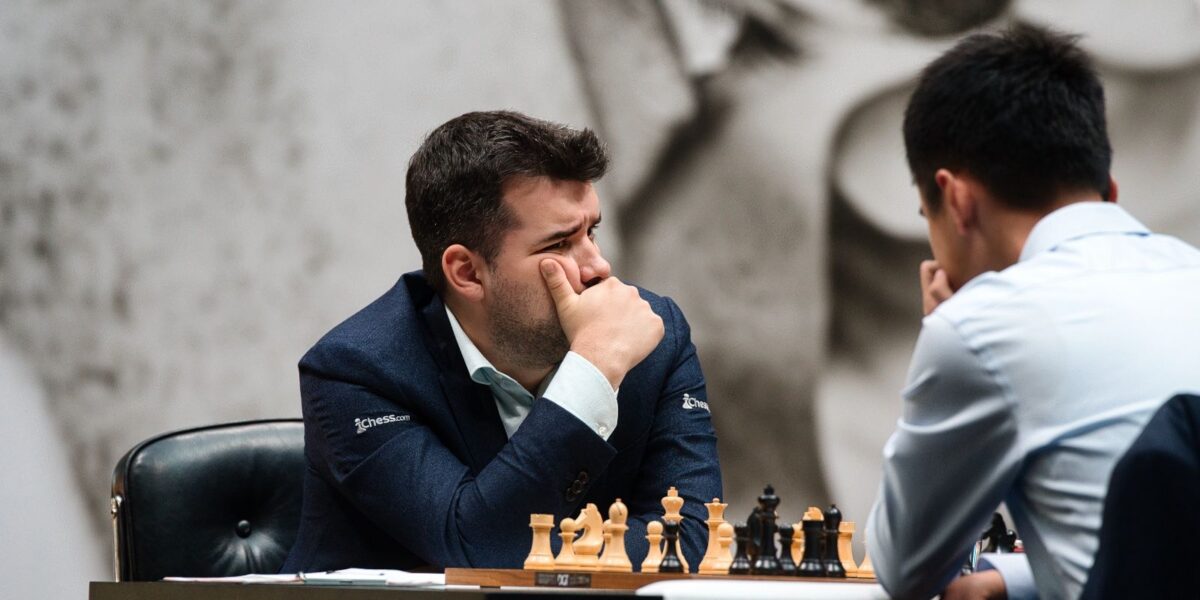GM Ian Nepomniachtchi shook up the third round of the 2023 FIDE World Championship by beginning his game against GM Ding Liren with a new first move, setting the stage for a fresh opening battle with 1.d4. Ding chose the Queen’s Gambit Declined in response and the game ended in a draw by repetition after 30 moves. Nepomniachtchi leads the match by one point.
The Chinese challenger will have the white pieces in game four, which begins on Thursday, April 13, at 15:00 Astana time (2 a.m. ET/11:00 CEST).
After Ding suffered a loss in game two, the chess community was buzzing with anticipation. A big question was: which approach would Ding adopt in game three? Would he come out with a fiery and aggressive strategy, or opt for a more calm and solid approach as Black? Ultimately, Ding adopted the solid approach and chose to play the Queen’s Gambit Declined.
In the press conference, Ding was open about being surprised by Nepomniachtchi’s first move. “I didn’t expect it, especially for this game. Although he has played it recently, it is not his main weapon. So, it came as a surprise this time.”
The players followed a rapid game between GM Anish Giri and Ding from the 2022 Chessable Masters until the 17th move. Nepomniachtchi was the first to deviate with 17.N1e2 instead of Giri’s 17.Qf2.
Talking about his game against Ding, an elated and smiling Giri said on the broadcast: “I am quite pleased. What he thought was worthy of playing against me in the rapid, he finds worth of playing in the World Championship match game. I feel honored that he wasted world championship match preparation against me!”
Speaking about the choice of opening and the resulting position, Nepomniachtchi revealed at the press conference that he had looked at the Giri vs. Ding rapid game prior to the round today. He added: “Queen’s Gambit Declined is a very solid opening. It’s hard to disrupt the equality.”
The commentators observed that Ding spent more time at the board, unlike the previous round where he spent more time thinking in the rest area. “I like the fact that he is sitting at the board. In the long term, it is going to help him if he is going away only when he needs to,” said commentator Howell.
Speaking further on the subject, Giri added: “The resting area is a luxury that players have only in top tournaments, and having a resting area with the screen where you can see your board is very rare even in top tournaments.”
Chess.com’s senior journalist FM Mike Klein asked Ding if he consciously chose to stay more at the board. Ding answered: “I would like to thank my friends as they helped me with my emotional problem. Now, I feel more comfortable at this stage.”
When asked to elaborate on it, he shared: “I thought that at some point that I had some trouble with my mind. It is not as serious as I expected. My friend talked to me and I realized that it may be concluded as pressure before the match.”
The game’s pace shifted when Ding began to play at a much faster tempo. It was during a critical moment in the game, when Ding recaptured the bishop with his knight, that Nepomniachtchi found himself thrust into deep thought.
In the post-game press conference, Ding talked about this critical moment: “I was not so happy about the result as after 21…Nxd7, which I think was missed by Ian, I was at least not worse and I was playing for win at some point. But, I couldn’t find a way to break through.”
The final critical moment in the game was when Ding chose to play 27…Nc7. “Instead of 27…Nc7, I also considered 27…d4, but it was too risky after exd4. So, I think, in the end, the draw is a pretty decent result for both of us.”
When asked about favorite movies, Ding was quick to say that it is hard to choose one favorite movie as it keeps changing with time. Nepomniachtchi chose The Reader as his favorite. When asked about music, Ding recalled that he recently listened to Bob Dylan’s “Blowin’ in the Wind” and Nepomniachtchi confessed to not having a fixed playlist and that his choice of music depends on the mood.
Apart from staying at the board for a longer time, Ding also relocated back to the St. Regis hotel. He looks more comfortable and confident than on the previous two days.
Conversations about the use of supercomputers are quite common when it comes to world championships. Ding responded to Klein’s question about the hardware he’s using: “[I] have a pretty strong computer, but not as strong as you are expecting.”
Nepomniachtchi said: “I guess the same story. To make your opponent afraid, you should claim that you have a super-super-computer. But… everyone has good engines and it is not something above the sky.”
Asked about whether his extended break from classical play has affected the quality of his chess, Ding responded: “It’s hard to say when the tournament is still going on. Let’s see what happens next.”
How do the players deal with and manage anxiety during a tournament or match? Nepomniachtchi said: “Quite poorly. If you don’t feel anything, then something is wrong with you. So, I guess it is part of the job.”
Ding replied: “I am getting better. You can see that I spent more time on the stage today than hiding in the rest room.”



